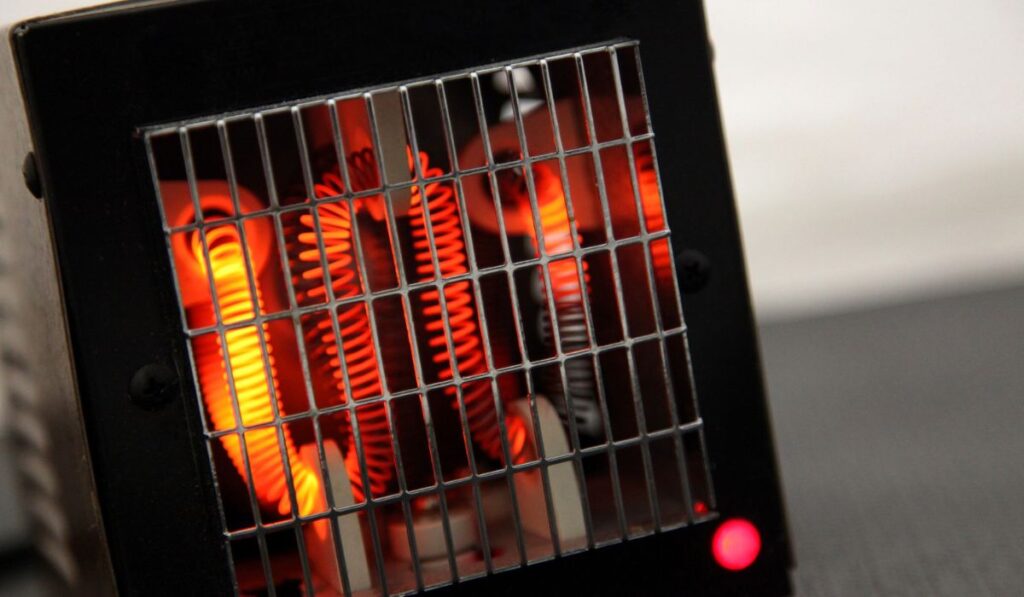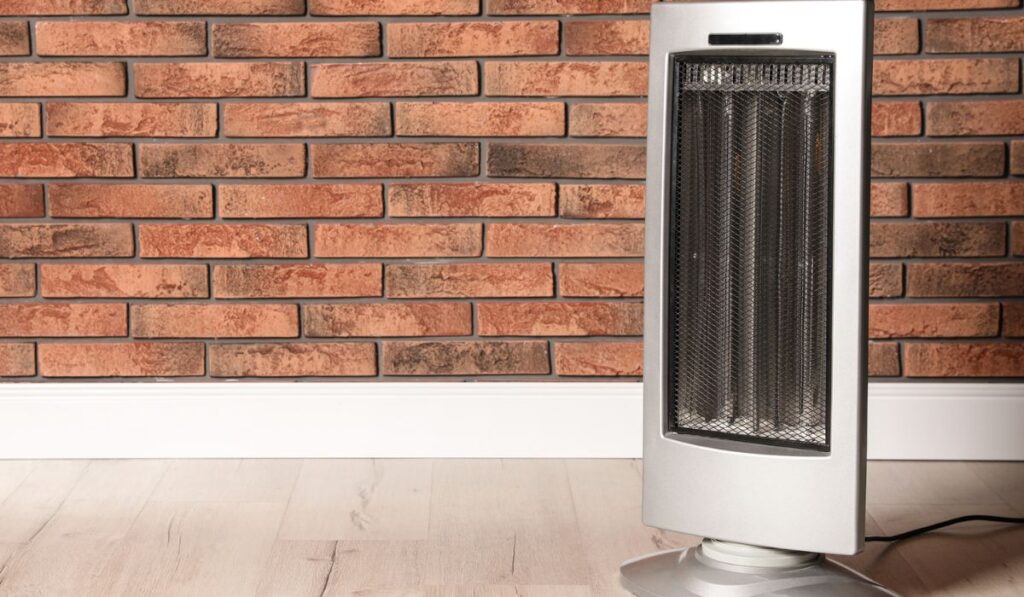Do you like your garage heated during winter, so you can work or stay in a nice, warm garage? If so, then how do you get your garage warm? There are numerous ways to warm a typical space, but they cannot be compared to a garage. But can you use a space heater in your garage?
You can, put a space heater in your garage, and a quality heater can quickly heat a garage of any size, assuming the heater’s power level is enough for the room’s square footage. However, you shouldn’t leave the heater unattended for long, and you shouldn’t leave it on all the time.
Being in a garage without heat may not be as terrible as standing outside in the cold but working in a heated garage certainly feels like heaven. And valuable safety tricks will be dished as you read on; keep in mind that installing a space heater is one of the best ways to improve the comfort of your garage.
Can You Put a Space Heater in Your Garage?

A space heater’s ability to warm up any space depends on how big the area is and the type of space heater your money can buy. There are even specific space heaters for outdoor use if you wish to heat your patio as well. Irrespective of what you use your garage for, be it a workshop, gym, or storage space, a space heater works in any.
A simple space heater like this one (on Amazon) can be used, but it probably won’t heat up your whole garage, especially in the winter. A bigger model like this (also on Amazon) can help, but unless your garage is insulated, it’s probably still going to remain a bit chilly in there.
Will a Space Heater be Safe in Your Garage?
Yes, a space heater will be safe in your garage provided you use it properly, taking note of the safety precautions for the correct usage. The device can supply a perfect amount of heat to any garage space so long as it is the ideal size and releases the correct wattage.
Knowing your space’s needs, investing in a premium space heater, and taking full advantage of your garage’s heat preservation will ensure your garage is safely and adequately heated for long-term coziness.
How to Install a Space Heater in Your Garage
Installing a space heater can either be done by a pro or on your own. If you are using the do-it-yourself technique, here are a few steps to follow:
- Before installation, insulate your garage completely by sealing off any crevices, including ones in your window frames, door frames, or between your garage door and the flooring.
- Afterward, fit some cloth all over your garage to help trap and maintain heat within their yarns, preserving the space’s warmth for a long while. Depending on your garage’s requirements, you can do this by using curtains, rubber garage mats, or rugs.
- Insulation is incomplete without insulating your garage door. It should be noted that all garage doors are made of specific metals that safeguard your home’s exterior more than being useful in regulating the interior’s temperature. To insulate the garage door, just use a garage door insulation kit for an easy, straightforward, and inexpensive job.
- Now that you have completed your insulation, you can install the right space heater by calculating the size and power of the device and determining where you will place it.
- For the size and power, professionals estimate about 10 watts of power per square foot of your garage. So, if you have a garage of 100 square feet, you will need a space heater with 1,000 watts. Alternatively, you can get two smaller ones of 500 watts each and place them on opposite sides of the garage.
- Regarding location, it is best to install your space heater at a safe distance, providing a wide range of heat coverage and away from flammable objects.
Best Space Heating Options for Your Garage
Among the numerous options available for space heating, below are the best, safest, and most reliable heating options for your garage.
Portable Space Heater
Portable space heaters are best used to amplify an existing heat system within your garage, especially during frigid days. They are also very convenient and readily available for use.
Electric Heater
Electric heaters are bigger than a portable space heater and are mounted on the wall, making them one of the best in providing wide heat coverage. In addition, they can be installed without needing a professional.
Infrared Heater
This heating option, in a low-intensity mode, will radiate heat throughout your garage and not blast through like the pressured-air heater. However, an infrared heater is more likely to heat objects first before occupants of the space, and the high-intensity ones tend to cause fire hazards.
Pressured-Air Heater
The pressured-air heater has different sizes and prices. It is less expensive than infrared heaters and works by discharging hot air into the room. This may not be good for paintings and unfinished projects as the blasted air tends to blow dirt around.
Convection Heater
A convection heater is versatile and can be powered by gas, propane, or electricity. It operates by air convection streams flowing through the heater and across its heating unit, heating the air around you. As a result, this heater heats up faster than others, depending on the size and model you purchase.
Ductless Heater
These are also referred to as split, split-ductless, or multi-split systems, as they can heat or cool any space with efficient energy use. Ductless heaters are easy to install and are considered environmentally friendly.
In-Floor Heater
In-floor heaters are not limited to bathrooms alone but are also perfect for heating garages. As the name implies, they are installed in the floorings and are a great add-on to any other heating device in your garage.
How Long Can You Leave a Space Heater Running in Your Garage?
The amount of time you can leave your space heater running in your garage depends on the type you invest in. Modern space heaters can be left on for a more extended period, up to ten hours or more, as long as you are in the same room.
However, safety experts recommend leaving your standard heater running for two to three hours and never while you are asleep.
What to Know Before Installing a Space Heater in Your Garage
Despite how simple purchasing a space heater may be, there are two considerations to be aware of before installing one in your garage, and they are:
A Space Heater Can Only Heat its Designated Room Size
Buying a space heater and just placing it in your garage may not have the effect you want, especially if the heater is smaller than the space. This is because space heaters are designed to heat a particular room size.
So, heating a larger room with a smaller space heater may result in you having to keep the equipment running for long hours, which is unsafe, to feel the warmth.
To avoid such and make the best use of the space heater in your garage, measure your garage’s area and use a top-quality space heater designed for larger spaces, not just the typical desk or personal heaters.
Your Garage is not Built to be Heated
Garages are structured in primary forms and with materials emphasizing sturdiness and the structure’s reliability instead of coziness or temperature control. Even though garages are not built to be heated, you can still heat them with a space heater.
However, to maximize the efficiency and durability of your space heater so it can spread warm air evenly throughout your garage, you should ensure all gaps where warm or cool air can get into the space are entirely sealed.
Other Safety Tips and Tricks

- Ensure your garage is well insulated before installing your space heater.
- Never leave the heater running for too long, when you go to sleep, or are not in the room/garage.
- Space heaters should not be used to warm bedding, cook food, thaw pipes, or dry clothes. Doing so increases your chances of starting a fire or getting burned.
- Always keep flammable items, liquids, fabrics, etc., at least three feet away from space heaters.
- Monitor children and pets when space heaters are used, as the slightest contact with a heating element, can cause a severe burn.
- Check for worn insulation, deteriorated wires, or overheating in electric space heaters. If you find any, ensure an expert fixes the problems before using the tool.
- Buy space heaters with automatic turn-off features and heating element protection.
- For liquid-fueled space heater, use only the fuel recommended by the producer. Do not use gasoline or any other alternative as the wrong fuel could burn hotter than the equipment’s design limits, possibly leading to a severe fire.
- Before refueling, turn off the space heater and let it cool completely. Then, make sure you wipe any fuel spillages without delay.
- If you want to purchase a kerosene heater, consult your local fire department to know if it is legal in your neighborhood and ensure you use it in a safe location that is not a fire risk.
- When using extension cords, select a cable of the correct wire scale size and type for your heater or, if possible, avoid using extension cords completely.
- For a new space heater purchase or any heating equipment, pick a space heater with the UL (Underwriters Laboratories) Mark, showing that UL technical staff members have tested characteristic product samples for predictable safety risks.
